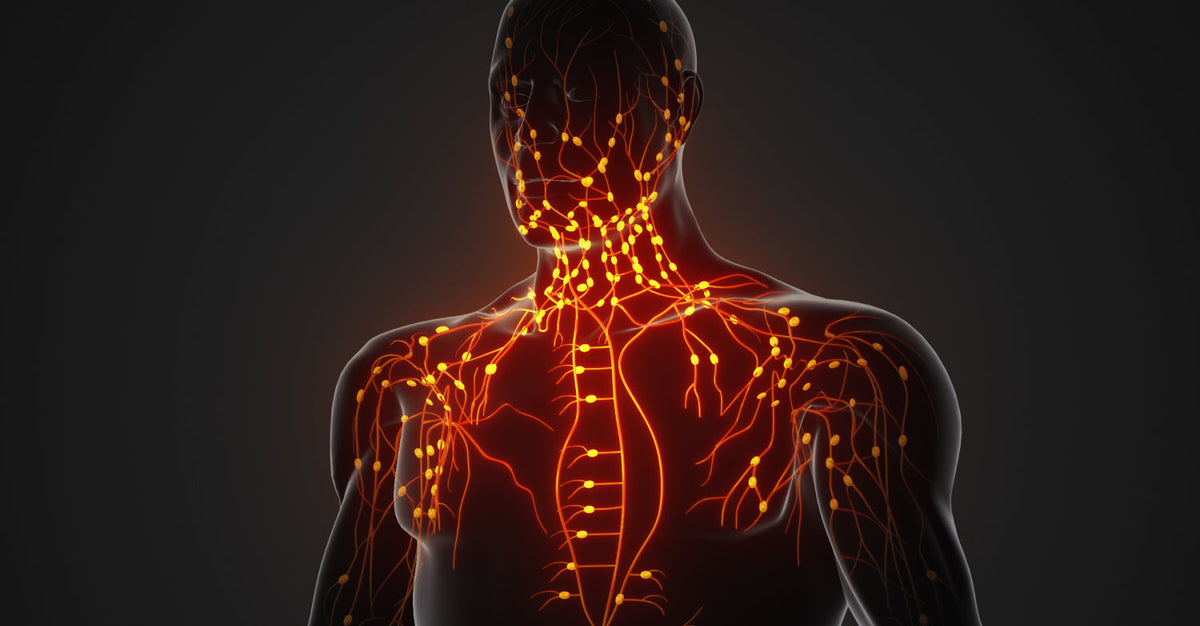

Your brain runs on approximately 20% of your body’s total energy—more than any other organ [1]. But all that activity generates waste. A lot of it. Every day, your brain clears out around seven grams of damaged proteins (roughly the weight of a pencil). If it didn’t, those misfolded proteins could build up, disrupting neural function and increasing the risk of neurodegenerative diseases.
For decades, scientists didn’t know how the brain managed this waste disposal. Then, in 2012, researchers discovered the glymphatic system—a specialized clearance network that flushes toxins while you sleep [2]. The glymphatic system is often referred to as the brain's waste removal system, highlighting its essential role in clearing harmful proteins and maintaining brain health. Studies suggest that proper function of this system is crucial for effective brain detoxification and may reduce the risk of neurodegenerative diseases. Authoritative research from the National Institutes of Health (NIH) has highlighted the importance of the glymphatic system in preventing neurological disorders and stroke by supporting brain detoxification and overall neurological health. Impaired glymphatic function has since been linked to conditions like Alzheimer’s disease and Parkinson’s disease, making this system a critical target for brain health and longevity [3].
So, how does it work? And more importantly, how can you optimize it? Let’s find out.
Looking for supplementation specifically designed to help you feel physically and mentally restored?
Be ready to face the day as your sharpest self with the Cognitive Lift Bundle by Tally Health. Achieve deeper, more restful nights and further enhance memory, boost focus, and support overall cognition as you age with two synergistic supplements - Restore, Tally’s supplement for better sleep, and Sharpen, for enhanced brain health.
Your brain’s night shift

The glymphatic system, the brain’s waste clearance mechanism, is closely tied to our sleep-wake cycles, with glymphatic activity decreasing by 90% during wakefulness, which highlights that the brain’s “deep cleaning” primarily takes place during sleep. In fact, 80-90% of this waste clearance occurs during slow-wave (deep) sleep [2]. When people sleep, the brain's detoxification pathways are most active, supporting the removal of neurotoxins. Sleep time is divided among different sleep stages, with the majority of glymphatic clearance occurring during NREM sleep, while REM sleep, a distinct stage, also plays a role in the sleep cycle. Research shows that people who sleep for a normal sleep duration—typically around 7-8 hours—have better glymphatic clearance and lower risk of neurodegenerative diseases. Getting enough sleep is essential for effective brain detoxification, while chronic sleep deprivation can impair glymphatic function and increase long-term risk of cognitive decline.
A recent study reveals that a drop in norepinephrine—a neurotransmitter that regulates alertness—enhances the flow of cerebrospinal fluid (CSF) during non-rapid eye movement (NREM) sleep (deep sleep). This increased CSF flow is a critical driver of glymphatic activity. However, the study also found that zolpidem (Ambien), a commonly prescribed sleep medication, suppresses norepinephrine fluctuations and glymphatic flow [5]. Sleeping pills may not provide the deep, restorative sleep needed for optimal glymphatic function.
Sleep deprivation reduces glymphatic clearance and increases the risk of neurodegenerative diseases. Sleep related conditions, such as sleep apnea or insomnia, can negatively impact glymphatic function. Sleep related issues, including circadian rhythm disruptions, are linked to neurodegeneration.
So what happens if the brain fails to properly clear waste? Neurotoxic substances, such as beta-amyloid and tau proteins, can accumulate, increasing the risk of cognitive decline and neurodegenerative diseases. Sleep problems, such as insomnia or disrupted sleep, can impair the glymphatic system's ability to clear neurotoxins.
Sleep apnea reduces glymphatic clearance

Obstructive sleep apnea (OSA) is a sleep disorder characterized by frequent interruptions in breathing during sleep, depriving the brain of oxygen. This disruption often results in loud snoring, chronic daytime fatigue, brain fog, morning headaches, memory issues, and difficulty concentrating. OSA is one of several sleep disorders that can impact brain health.
An estimated 30 million adults in the U.S. are affected by OSA, yet only 6 million have been diagnosed—leaving 80% undiagnosed [6]. Why does this matter? Untreated OSA not only increases the risk of heart attack and stroke but has also been linked to impaired glymphatic function [7, 8]. OSA and other sleep disorders are linked to a variety of health conditions, including cardiovascular and neurodegenerative diseases. OSA is also strongly associated with a heightened risk of developing dementia [9]. A meta-analysis found that individuals with OSA were 26% more likely to experience significant cognitive decline or dementia within 3 to 15 years [10].
Interestingly, research suggests that the standard treatment for OSA—continuous positive airway pressure (CPAP)—can improve cerebrospinal fluid (CSF) flow and glymphatic function in both human and animal models [11, 12]. OSA leads to reduced glymphatic clearance, which contributes to the buildup of neurotoxic proteins such as amyloid-beta and tau. These findings underscore two key insights: first, CPAP therapy may enhance glymphatic function in individuals with OSA, potentially lowering their risk of developing dementia. Second, glymphatic function could play a far more significant role in safeguarding against cognitive decline than previously understood.
The link between aging, glymphatic function, and brain health

Research indicates that the glymphatic system’s ability to clear waste effectively declines with age, which contributes to the buildup of harmful toxins associated with an increased risk of Alzheimer’s disease [13, 14]. Amyloid beta accumulation, a hallmark of Alzheimer's disease, is one of the key toxic proteins that builds up when glymphatic clearance is impaired. Studies show that glymphatic clearance is significantly reduced in Alzheimer's patients compared to healthy controls, leading to greater amyloid beta accumulation and neurodegeneration. This impaired glymphatic function in aging brains negatively affects brain function and cognitive health, contributing to the progression of neurodegenerative diseases. This system plays a vital role in removing reactive oxygen species (ROS) and pro-inflammatory cytokines—compounds that can trigger chronic inflammation, also known as inflammaging, and lead to other age-related neurodegenerative diseases [15]. Supporting good sleep and healthy routines is essential for the well-being of older adults, as sleep quality directly impacts brain health.
Another concern is that as we age we also experience a decline in NREM sleep, which is critical for proper glymphatic function. Inadequate sleep during midlife has been linked to increased risk of cognitive decline and amyloid beta accumulation, further elevating the risk of dementia. Therefore, preserving or enhancing NREM sleep in older adults is critical for maintaining cognitive function. Age group-specific sleep recommendations are important, as sleep needs vary throughout life, and following these guidelines supports optimal brain health. Interestingly, studies of centenarians show that individuals aged 85–105 retain similar levels of NREM sleep as young adults aged 20–30. This preservation of deep sleep may be attributed to the adherence to strict, consistent sleep schedules [16]. Additional research underscores that maintaining a regular sleep routine is a stronger predictor of longevity than sleep duration alone [17].
Science-backed tips for improving brain health through a good night's rest

Deep sleep is essential for metabolite clearance and solute clearance from the brain, as it activates the glymphatic system to remove waste products. The glymphatic system plays a crucial role in clearing harmful proteins and toxic proteins, such as amyloid beta and hyperphosphorylated tau, which are associated with Alzheimer’s disease. Effective waste removal depends on fluid movement, the exchange between cerebrospinal fluid (CSF) and interstitial fluid, and the expansion of the extracellular space during sleep. Amyloid beta and tau proteins tend to accumulate in the brain parenchyma, but the glymphatic system helps clear these aggregates to support brain health. The glymphatic system is analogous to the lymphatic system found elsewhere in the body, and cervical lymphatic vessels are important pathways for draining metabolic waste from the brain. The nervous system, including glial cells and brain cells, is integral to glymphatic function and brain detoxification.
Optimizing glymphatic function starts with supporting deep, restorative sleep, and these science-backed strategies can help you achieve both:
Sleep on your side
Gravity plays a role in the movement of CSF within the brain, which suggests that sleep position may influence the brain's ability to remove waste. While further research is needed, early studies indicate that glymphatic transport—responsible for clearing waste from the brain—is more effective when sleeping on your left side compared to sleeping on your back or stomach [18]. Notably, individuals with dementia have been observed to spend more time sleeping on their backs than those without the condition [19].
Focus on improving sleep quality
Poor sleep quality has been linked to impaired waste removal in the brain [20]. While many factors can disrupt sleep, one of the most common is screen time and light exposure before bed. Research reveals that 9 out of 10 Americans use a device before bedtime [21]. However, more interactive devices that emit blue light like smartphones and computers, when used within an hour of sleep, make it harder to fall asleep and leave individuals feeling less refreshed.
To improve normal sleep patterns, consider implementing these simple changes: create a completely dark sleeping environment—even minimal light can disrupt sleep quality [22]—and limit exposure to blue light-emitting screens at least one hour before bed.
Reduce alcohol consumption
Research suggests that alcohol consumption affects glymphatic clearance in the brain, a process crucial for removing waste. In mice, medium to high doses of alcohol inhibited this clearance, while low doses showed a slight improvement in activity [23]. This finding may help explain why older adults who abstain entirely or consume alcohol heavily are at a higher risk of dementia compared to those who drink occasionally and in moderation [24]. While this is certainly not an endorsement to drink more, it does suggest that an occasional glass of wine with friends may not be all bad.
Consider L-theanine
L-theanine, a key ingredient in our sleep supplement, Restore, has been shown to increase NREM sleep by 20.6% (particularly when combined with GABA), which is necessary for optimal glymphatic function [25, 26]. L-theanine has been shown to reduce norepinephrine levels and may allow CSF to flow more freely to support enhanced waste removal in the brain [27].
Prioritize regular physical activity
Exercise not only enhances blood circulation but also supports healthy glymphatic function. Research indicates that aerobic activities, such as running, significantly improved glymphatic clearance, reduced amyloid beta buildup, and lowered neuroinflammation in mice [28].
Consider omega-3 fatty acids:
Omega-3 fatty acids are well-known for their anti-inflammatory and neuroprotective properties [29], but recent research has uncovered another promising benefit: omega-3s may enhance glymphatic function, aiding in the clearance of amyloid beta from the brain in mice. This finding offers the potential for slowing or even preventing the onset of Alzheimer’s disease [30].
What is the glymphatic system and what does it do?
The glymphatic system is the brain’s waste clearance network, responsible for flushing out neurotoxic waste like beta-amyloid and tau proteins—especially during deep sleep. Discovered in 2012, it plays a critical role in protecting brain health and reducing the risk of neurodegenerative diseases like Alzheimer’s and Parkinson’s.
How does sleep affect the glymphatic system?
Sleep—particularly deep (NREM) sleep—is essential for glymphatic system function. Around 80–90% of brain waste clearance happens during this stage. Poor sleep or conditions like sleep apnea can impair this system, leading to a buildup of harmful proteins and a higher risk of cognitive decline and dementia.
Can sleep position improve brain detoxification?
Yes, research suggests that sleeping on your side—especially the left side—may enhance glymphatic clearance more effectively than sleeping on your back or stomach. This position may help cerebrospinal fluid (CSF) move more freely, aiding the brain’s detox process during sleep.
Recommended Supplements
Citations
[1] Padamsey, Z., & Rochefort, N. L. (2023). Paying the brain's energy bill. Current Opinion in Neurobiology, 78, 102668. https://doi.org/10.1016/j.conb.2022.102668
[2] Reddy, O. C. (2020). The Sleeping Brain: Harnessing the Power of the Glymphatic System through Lifestyle Choices. Brain Sciences, 10(11), 868. https://doi.org/10.3390/brainsci10110868
[3] Jessen, N.A., Munk, A.S.F., Lundgaard, I. et al. The Glymphatic System: A Beginner’s Guide. Neurochem Res 40, 2583–2599 (2015). https://doi.org/10.1007/s11064-015-1581-6
[4] Reddy, O. C. (2020). The Sleeping Brain: Harnessing the Power of the Glymphatic System through Lifestyle Choices. Brain Sciences, 10(11), 868. https://doi.org/10.3390/brainsci10110868
[5] Hauglund, N. L., Kusk, P., MacAulay, N., & Nedergaard, M. (2023). Norepinephrine-mediated slow vasomotion drives glymphatic clearance during sleep. Cell, 188(3), 606-622.e17. https://doi.org/10.1016/j.cell.2023.01.003
[6] Berg, S. (2022). What doctors wish patients knew about sleep apnea. American Medical Association. Retrieved from https://www.ama-assn.org/delivering-care/public-health/what-doctors-wish-patients-knew-about-sleep-apnea
[7] Jean-Louis G, Zizi F, Clark LT, Brown CD, McFarlane SI. Obstructive sleep apnea and cardiovascular disease: role of the metabolic syndrome and its components. J Clin Sleep Med. 2008 Jun 15;4(3):261-72. PMID: 18595441; PMCID: PMC2546461.
[8] Park, H. J., Paik, S. M., Kim, J. R., Lee, M., Lee, W., Lee, S., Shin, C., & Yun, C. (2024). 1006 Effect of Obstructive Sleep Apnea on the Longitudinal Change in the Glymphatic System Function. Sleep, 47(Supplement_1), A432. https://doi.org/10.1093/sleep/zsae067.01006
[9] Guay-Gagnon M, Vat S, Forget MF, Tremblay-Gravel M, Ducharme S, Nguyen QD, Desmarais P. Sleep apnea and the risk of dementia: A systematic review and meta-analysis. J Sleep Res. 2022 Oct;31(5):e13589. doi: 10.1111/jsr.13589. Epub 2022 Apr 2. PMID: 35366021.
[10] Gosselin, N., Baril, A., Osorio, R. S., Kaminska, M., & Carrier, J. (2019). Obstructive Sleep Apnea and the Risk of Cognitive Decline in Older Adults. American Journal of Respiratory and Critical Care Medicine, 199(2), 142. https://doi.org/10.1164/rccm.201801-0204PP
[11] Ozturk, B., Koundal, S., Bizri, E. A., Chen, X., Gursky, Z., Dai, F., Lim, A., Heerdt, P., Kipnis, J., Tannenbaum, A., Lee, H., & Benveniste, H. (2023). Continuous positive airway pressure increases CSF flow and glymphatic transport. JCI Insight, 8(12), e170270. https://doi.org/10.1172/jci.insight.170270
[12] Wang, J., Tian, Y., Qin, C. et al. Impaired glymphatic drainage underlying obstructive sleep apnea is associated with cognitive dysfunction. J Neurol 270, 2204–2216 (2023). https://doi.org/10.1007/s00415-022-11530-z
[13] Hablitz, L. M., & Nedergaard, M. (2021). The Glymphatic System: A Novel Component of Fundamental Neurobiology. The Journal of Neuroscience, 41(37), 7698. https://doi.org/10.1523/JNEUROSCI.0619-21.2021
[14] Benveniste, H., Liu, X., Koundal, S., Sanggaard, S., Lee, H., & Wardlaw, J. (2019). The glymphatic system and waste clearance with brain aging: A review. Gerontology, 65(2), 106–119. https://doi.org/10.1159/000490349
[15] Gu, S., Li, Y., Jiang, Y., Huang, J. H., & Wang, F. (2022). Glymphatic Dysfunction Induced Oxidative Stress and Neuro-Inflammation in Major Depression Disorders. Antioxidants, 11(11), 2296. https://doi.org/10.3390/antiox11112296
[16] Mazzotti, D. R., Guindalini, C., Moraes, W. A., Andersen, M. L., Cendoroglo, M. S., Ramos, L. R., & Tufik, S. (2014). Human longevity is associated with regular sleep patterns, maintenance of slow wave sleep, and favorable lipid profile. Frontiers in Aging Neuroscience, 6, 83651. https://doi.org/10.3389/fnagi.2014.00134
[17] Daniel P Windred, Angus C Burns, Jacqueline M Lane, Richa Saxena, Martin K Rutter, Sean W Cain, Andrew J K Phillips, Sleep regularity is a stronger predictor of mortality risk than sleep duration: A prospective cohort study, Sleep, Volume 47, Issue 1, January 2024, zsad253, https://doi.org/10.1093/sleep/zsad253
[18] Lee H, Xie L, Yu M, Kang H, Feng T, Deane R, Logan J, Nedergaard M, Benveniste H. The Effect of Body Posture on Brain Glymphatic Transport. J Neurosci. 2015 Aug 5;35(31):11034-44. doi: 10.1523/JNEUROSCI.1625-15.2015. PMID: 26245965; PMCID: PMC4524974.
[19] Levendowski, D. J., Gamaldo, C., St. Louis, E. K., Ferini-Strambi, L., Hamilton, J. M., Salat, D., Westbrook, P. R., & Berka, C. (2019). Head Position During Sleep: Potential Implications for Patients with Neurodegenerative Disease. Journal of Alzheimer’s Disease. https://doi.org/10.3233_JAD-180697
[20] Ma, J., Chen, M., Liu, G., Gao, M., Chen, N., Toh, C. H., Hsu, J., Wu, K., Huang, C., Lin, C., Fang, J., Lee, S., & Lee, T. M. (2024). Effects of sleep on the glymphatic functioning and multimodal human brain network affecting memory in older adults. Molecular Psychiatry, 1-13. https://doi.org/10.1038/s41380-024-02778-0
[21] Gradisar, M., Wolfson, A. R., Harvey, A. G., Hale, L., Rosenberg, R., & Czeisler, C. A. (2013). The Sleep and Technology Use of Americans: Findings from the National Sleep Foundation's 2011 Sleep in America Poll. Journal of Clinical Sleep Medicine : JCSM : Official Publication of the American Academy of Sleep Medicine, 9(12), 1291. https://doi.org/10.5664/jcsm.3272
[22] Mason, I. C., Grimaldi, D., Reid, K. J., Warlick, C. D., Malkani, R. G., Abbott, S. M., & Zee, P. C. (2022). Light exposure during sleep impairs cardiometabolic function. Proceedings of the National Academy of Sciences, 119(12), e2113290119. https://doi.org/10.1073/pnas.2113290119
[23] Lundgaard I, Wang W, Eberhardt A, Vinitsky HS, Reeves BC, Peng S, Lou N, Hussain R, Nedergaard M. Beneficial effects of low alcohol exposure, but adverse effects of high alcohol intake on glymphatic function. Sci Rep. 2018 Feb 2;8(1):2246. doi: 10.1038/s41598-018-20424-y. PMID: 29396480; PMCID: PMC5797082.
[24] Mewton, L., Visontay, R., Hoy, N., Lipnicki, D. M., Sunderland, M., Lipton, R. B., Guerchet, M., Ritchie, K., Najar, J., Scarmeas, N., Kim, W., Heller, S. R., Jacobsen, E., Brodaty, H., Anstey, K. J., Haan, M., Scazufca, M., Lobo, E., & Sachdev, P. S. (2023). The relationship between alcohol use and dementia in adults aged more than 60 years: A combined analysis of prospective, individual-participant data from 15 international studies. Addiction, 118(3), 412-424. https://doi.org/10.1111/add.16035
[25] Dasdelen, M. F., Er, S., Kaplan, B., Celik, S., Beker, M. C., Orhan, C., Tuzcu, M., Sahin, N., Mamedova, H., Sylla, S., Komorowski, J., Ojalvo, S. P., Sahin, K., & Kilic, E. (2022). A Novel Theanine Complex, Mg-L-Theanine Improves Sleep Quality via Regulating Brain Electrochemical Activity. Frontiers in Nutrition, 9, 874254. https://doi.org/10.3389/fnut.2022.874254
[26] Kim S, Jo K, Hong KB, Han SH, Suh HJ. GABA and l-theanine mixture decreases sleep latency and improves NREM sleep. Pharm Biol. 2019 Dec;57(1):65-73. doi: 10.1080/13880209.2018.1557698. PMID: 30707852; PMCID: PMC6366437.
[27] Dasdelen, M. F., Er, S., Kaplan, B., Celik, S., Beker, M. C., Orhan, C., Tuzcu, M., Sahin, N., Mamedova, H., Sylla, S., Komorowski, J., Ojalvo, S. P., Sahin, K., & Kilic, E. (2022). A Novel Theanine Complex, Mg-L-Theanine Improves Sleep Quality via Regulating Brain Electrochemical Activity. Frontiers in Nutrition, 9, 874254. https://doi.org/10.3389/fnut.2022.874254
[28] Olegário, R. L., Nóbrega, O. T., & Camargos, E. F. (2024). The newly discovered glymphatic system: The missing link between physical exercise and brain health? Frontiers in Integrative Neuroscience, 18, 1349563. https://doi.org/10.3389/fnint.2024.1349563
[29] Malau, I. A., Chang, J. P., Lin, Y., Chang, C., Chiu, W., & Su, K. (2024). Omega-3 Fatty Acids and Neuroinflammation in Depression: Targeting Damage-Associated Molecular Patterns and Neural Biomarkers. Cells, 13(21), 1791. https://doi.org/10.3390/cells13211791
[30] Wen J, Satyanarayanan SK, Li A, Yan L, Zhao Z, Yuan Q, Su KP, Su H. Unraveling the impact of Omega-3 polyunsaturated fatty acids on blood-brain barrier (BBB) integrity and glymphatic function. Brain Behav Immun. 2024 Jan;115:335-355. doi: 10.1016/j.bbi.2023.10.018. Epub 2023 Oct 31. PMID: 37914102.











